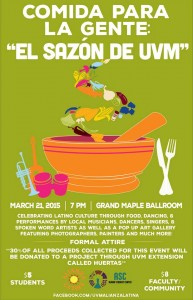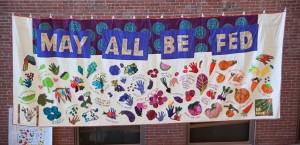2015 is off to a great start with seven new interns joining the Huertas team! We are so excited to be working with a group of so many awesome women and we want to use our first post of the new year to introduce everyone!
Sarah Shaw, a senior in the Global and Regional Studies Program, grew up in the Finger Lakes Region of Central New York, but has called Vermont “home” since 2013. After spending a semester studying Food Systems and Spanish in Oaxaca, Mexico, Sarah returned to Burlington with the hopes of becoming more involved in the Burlington and UVM communities. She has interned with the Vermont Community Garden Network, and has been an Service-Learning TA for the CUPS program at UVM since August of 2014. It was through these experiences, as well as her own studies, that Sarah became involved with Huertas. She is extremely passionate about the work that Huertas does, and she gets even more excited about getting other UVM students involved via experiential learning through her TA responsibilities. When she doesn’t have her nose in a book, Sarah spends her time outdoors hiking, skiing, camping, gardening, and enthusiastically exploring.
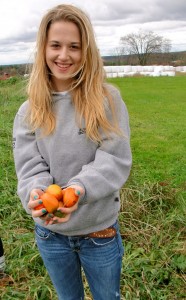
Zoe Halvorsen is the VISTA Volunteer Coordinator with the UVM Extension Migrant Education Program. Her role as the Huertas Central Vermont Coordinator is to identify greenhouse seedling growers and migrant farmworkers interested in creating gardens throughout Washington and La Moille counties. When not searching for volunteer tutors and garden hands, she can be found skiing, biking and enjoying all the great things Vermont has to offer. Her favorite color is outside and she is thrilled to be a part of the Huertas project.

Alina Rossini is the Migrant Health Promoter and Huertas Coordinator for the Northeast Kingdom. When not travelling into the depths of the NEK, she can be found milking cows, throwing pots, or baking in her drafty old farmhouse. She has a Masters Degree in Public Health from Boston University and is excited to use her skills to better food security in her region.
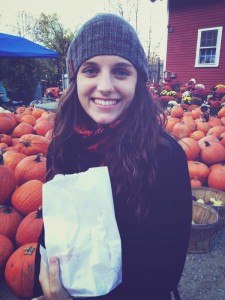
Eliza Hamburger, a second year student at UVM, is one of the field interns for Huertas this season. She comes from Washington, D.C., which she loves very much, but Vermont is a close second. She is majoring in environmental studies with special interests in food justice and access and urban sustainability. Eliza has spoken Spanish since she was young and attended a bilingual elementary school. She also loves gardening and watching plants grow, so Huertas felt like a great fit! As a field intern, she will be working with farmworkers in Franklin and Grand Isle counties. Eliza is excited to meet and connect with new people, learn, and help plant beautiful gardens this season!

Dana Bronstein, 23 year old senior at the University of Vermont, and is studying Anthropology and Food Systems. Dana was born in Santiago, Chile, but raised in New York City. Passionate about farming, cooking, yoga, rock climbing, reading and writing. Her dream is to bike from Alaska to the tip of Chile all along the coast writing and learning about community supported and organic agriculture.
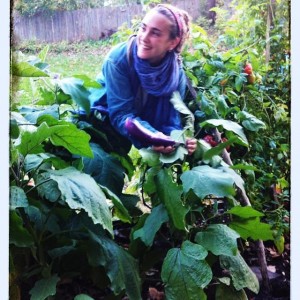
Jennifer Alexandra Gil is a second year student at the University of Vermont. She is pursuing a bachelor’s degree in Natural Resources: Resource Ecology through the Rubenstein School of Environment and Natural Resources and a minor in Food Systems. Jennifer is the Secretary/Publicist of an ALANA (African/Latino/Asian/Native American) organization on campus called Alianza Latina. She is also a part of a newly evolving social justice group on campus called the ALANA Student Leader’s Coalition. Jennifer’s involvement in social justice activism as well as concentrating her studies in agriculture have inspired to integrate the two and join the Huertas team. Having the opportunity to be a part of Huertas, Jennifer is the new ALANA Liaison. Her position concentrates mostly in organizing more student involvement on campus, specifically from the ALANA community, as well as connecting Alianza Latina with the Huertas project. She also wants to use her position to brainstorm great activities aside from gardening with the families, to create stronger interpersonal relationships. She plans on using her skills in creating natural beauty products and organize home visit workshops for the women on the farm. She wants to give them the opportunity to not only learn how to use everyday house items ecologically but also connect that with idea of self-care. Jennifer truly is passionate about working with people and is looking forward to all the new things she’s going to learn with her experiences in Huertas!
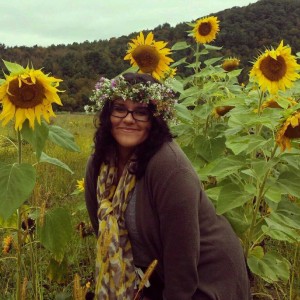
Claire Macon is a sophomore from Atlanta, GA, studying Global Studies and Spanish with a minor in Community and International Development. After spending a year after high school living in Quito, Ecuador, Claire developed a passion for spanish and helping people. She is excited to use her position as Communications Intern to connect to the Huertas project with the greater Burlington community. In her spare time she enjoys riding her bike, cooking, crafting, gardening, and talking about social justice.
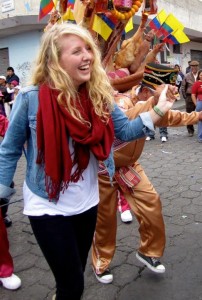
We are all extremely excited to have an opportunity to make and achieve goals for this coming year and we look forward to tracking our progress for everyone to see through blog posts!
